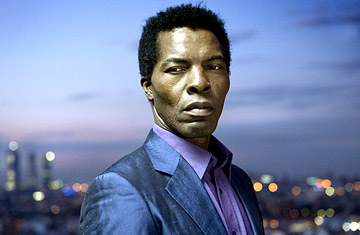
Isaach De Bankolé in Jim Jarmusch's The Limits of Control
"As I was going down impassive rivers,
I no longer felt myself guided by haulers!"
There are many translations of those first two lines, and this is not the one Jarmusch provided — but due to my inability to write fast enough in the dark, I'm using that of Wallace Fowlie, an authority on French poetry. Fowlie, who died in 1998, devoted entire semesters of teaching at Duke University to Dante and Proust, which sounds like serious stuff, but he was noted for his fine sense of humor. I have no doubt that, confronted with The Limits of Control, he would have offered a fresh translation, "As I was going down that impassive narrative, I no longer felt myself guided by a director!"
See the world's most influential people in the 2009 TIME 100.
Nonetheless, he would have gotten a kick out of Jarmusch's languid absurdity, most of which seems intended and is for the most part pleasing. The film, which is set entirely in Spain, is visually precise and quite beautiful but deliberately vague on details like plot points and names. The lead is Lone Man, played by Jarmusch regular Isaach De Bankolé, who deserves to be called something more evocative, like "He of the Supreme Cheekbones." His first set of marching orders — he gets many — are to "go to the towers, go to the cafe and look for the violin," and his employer sums up the theme of his mission as "Reality is arbitrary." In today's economy, who is going to complain about a boss with a tendency to wax philosophical?
As Lone Man makes his way from Madrid to Seville and then into the countryside toward his wealthy target, American, aka the Man (Bill Murray, who starred in Jarmusch's lovely Broken Flowers), he encounters a cast of characters who trade boxes of matches with him and pass on more tidbits of instruction along with commentary on art and culture. There's Guitar (John Hurt), Mexican (Gael Garcia Bernal) and the most helpful of all, Blonde (Tilda Swinton), who is a fan of Jarmusch-style cinema. "The best films are like dreams you're never really sure you've had," she tells him. (See the top 10 movie performances of 2008.)
Lone Man greets her musing as he does most evidence of other life forms, with the blank stare of a supermodel. If you thought Jason Bourne was terse, the Lone Man makes him seem like Regis Philbin. Come to think of it, The Limits of Control is like a Bourne film, except one in which everything goes smoothly for Jason, the workdays include a lot of napping and there's no blood, although cinematographer Christopher Doyle does regularly frame our hero against sumptuous red surfaces. At the climax, when confronted with a seemingly impenetrable fortress, instead of scaling walls and snapping necks, our hero just thinks his way inside. No fuss, no muss.
In its pacing, The Limits of Control is like an antidote to Internet surfing, and it is easy to fall into its enigmatic rhythms, bobbing along in the shallows like — good heavens, it's all connecting now — a drunken boat or something. In this spirit, the first time the Nude (Paz de la Huerta) hove into sight, nude on the Lone Man's bed, her rump in the air, wearing librarian glasses, she made perfect sense. Every cinematic hitman has a distracting girl stashed somewhere, and the blatant use of her sexuality needs to be parodied. (Her first line is the utterly rhetorical, "Do you like my [bottom]?")
It's profound really, what Jarmusch is doing. Oh wait, here she comes again. Still naked. And Lone Man is still not going for it, because he doesn't do sex while he's working. But he's sitting next to her on the couch. And absolutely every human being in the theater, having absorbed the profundity of the Nude's nudity, is now admiring her admirable breasts. Her third scene includes some wardrobe, namely a clear plastic raincoat, which has to be meaningful. Finally, she puts on a fuzzy sweater, but still no pants, which tends to draw the eye downward. Being an optimist, I prepared for Gael Garcia Bernal's pantless scene, but no go. By the end of Nude's screen time, Emperor Jarmusch himself seems a lot less cool, like maybe just an arty guy, with a fantastic eye, but some limits to his control.
